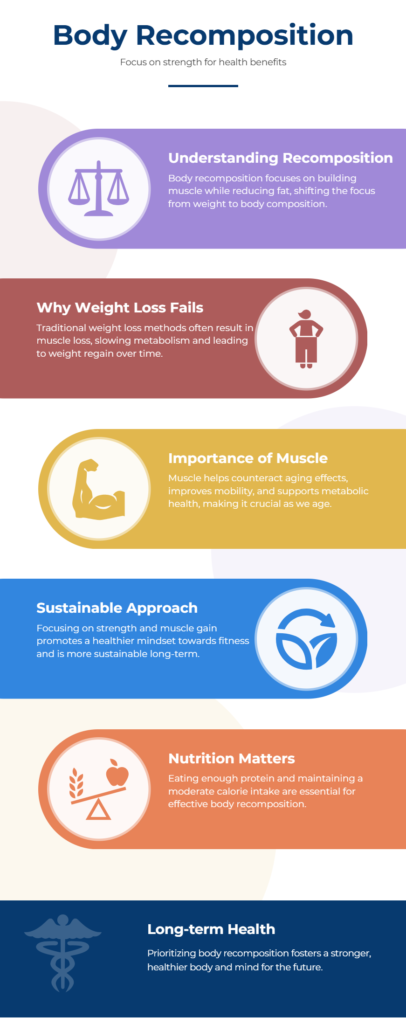Don’t miss a post. Click here to sign up for our free newsletter.
Estimated reading time: 8 minutes
Muscle Gain Trumps Weight Loss for Health and Longevity
For decades, the conversation around fitness and health has largely revolved around one thing: weight loss. The number on the scale has been seen as the primary indicator of health, and losing weight has often been the ultimate goal. But more recently, a shift in the narrative is emerging—a much-needed one, in my opinion. Instead of focusing solely on weight loss, the discussion is increasingly centered around strength gain and lean mass percentage.
This is where the concept of body recomposition steps in. It’s no longer about seeing that number on the scale drop but about changing the fat-to-lean muscle mass ratio. The goal is to build muscle while reducing fat, leading to a stronger, healthier, and more sustainable body. This shift in focus is not only more effective for long-term health but also promotes a healthier mindset towards fitness and nutrition.
What Is Body Recomposition?
Body recomposition refers to the process of building muscle while simultaneously reducing fat. Instead of focusing on how much you weigh, the aim is to change your body composition, which is the ratio of muscle to fat in your body. This method places less emphasis on the numbers on the scale and more on lean mass, which is the total weight of muscle, bone, water, and organs in the body, excluding fat.
When you go on a diet and lose weight too quickly—especially through drastic calorie restriction—you risk losing lean muscle mass. This is problematic because muscle is crucial for metabolic health, strength, and mobility, particularly as we age. Plus, muscle tissue burns more calories at rest compared to fat tissue, so losing muscle can lead to a slowdown in metabolism, making it harder to keep weight off in the long run.
By prioritizing muscle gain over simple weight loss, we can achieve a healthier and more sustainable approach to fitness.
Why Losing Weight Isn’t Enough
Traditional weight-loss methods, particularly those involving aggressive calorie deficits, can lead to rapid fat loss but also to significant muscle loss. Here’s why that’s a problem:
- Muscle loss slows metabolism: Muscle is metabolically active tissue. The more muscle you have, the more calories your body burns at rest. When you lose muscle mass, your metabolism slows down, making it harder to lose weight and easier to gain it back after you stop dieting.
- Long-term consequences: Losing muscle over time can contribute to a range of health issues, from reduced mobility to increased risk of injury. This is especially problematic as we age since muscle mass naturally declines with age, a process known as sarcopenia.
- Weight regain: Many people who lose weight through dieting eventually gain it back—and then some. This is known as the yo-yo effect and is partly because muscle loss from dieting lowers your metabolic rate. When you return to normal eating habits, you’re more likely to store those excess calories as fat.
The Importance of Muscle as We Age
One of the biggest reasons to focus on building muscle is that it becomes more critical as we age. Muscle loss is a natural part of the aging process, but it’s something we can combat with the right approach. After the age of 30, we begin to lose muscle mass at a rate of about 3% to 5% per decade, according to research from the National Institutes of Health (NIH). This gradual decline in muscle can affect everything from mobility to metabolism, and it’s often one of the main reasons people struggle to maintain their weight as they get older.
Strength training helps to counteract muscle loss, preserving mobility, balance, and overall health. For older adults, strength training is linked with:
- Reduced risk of falls and fractures: Maintaining muscle strength helps improve balance and coordination, which are key to preventing falls—a major cause of injury in older adults.
- Improved bone density: Strength training can also help maintain and even improve bone density, reducing the risk of osteoporosis.
- Better metabolic health: Muscle tissue plays a crucial role in maintaining blood sugar levels and improving insulin sensitivity, both of which are critical for preventing or managing type 2 diabetes.
Muscle Burns More Energy than Fat
Muscle is not just for looks or strength; it’s also a metabolic powerhouse. Muscle burns more calories than fat, even when you’re at rest. According to the American Council on Exercise, one pound of muscle burns approximately six calories per day at rest, while one pound of fat burns just two.
That may not seem like a huge difference, but over time, it adds up. When you focus on building muscle, you effectively increase your resting metabolic rate (RMR). This means you burn more calories throughout the day, even when you’re not working out. The more muscle you have, the more energy your body requires to maintain it, making it easier to stay lean and fit.
This explains why people often gain back more weight after losing muscle from extreme dieting. They’ve decreased their ability to burn calories, so when they return to their old eating habits, the weight piles back on—usually in the form of fat.
Shifting Focus to Strength and Muscle Development
When we stop obsessing over the scale and instead focus on building strength and muscle, everything changes.
- Sustainability: Unlike aggressive diets that are hard to maintain, strength training and focusing on body recomposition are more sustainable in the long term. You don’t need to constantly slash calories to see results, making it a much more balanced and enjoyable approach to fitness.
- Mental benefits: The mental shift from “I need to lose weight” to “I want to be strong and healthy” can have a profound impact on how we view exercise and nutrition. Instead of focusing on restriction, we focus on growth—both physically and mentally. This leads to a much healthier relationship with food and exercise.
- Improved performance: Whether it’s daily activities like lifting groceries or more athletic pursuits like running or cycling, building muscle and strength will improve your performance in every aspect of life.
- Fat loss without muscle loss: By maintaining a reasonable caloric intake and consuming enough protein, you can build muscle while losing fat without sacrificing your strength or metabolic health.
The Role of Nutrition in Body Recomposition
When it comes to body recomposition, nutrition is just as important as exercise. To build muscle and lose fat, you need to:
- Eat enough protein: Protein is the building block of muscle. Studies suggest that for optimal muscle growth, adults should aim for about 1.6 to 2.2 grams of protein per kilogram of body weight per day. For a 150-pound person, that equates to roughly 110 to 150 grams of protein per day.
- Consume a moderate calorie intake: You don’t need to be in a massive calorie deficit to lose fat. In fact, a small deficit combined with strength training and a high-protein diet is more effective for body recomposition. The goal is to give your body enough fuel to build muscle while creating a slight deficit to burn fat.
- Time your meals: Spreading your protein intake evenly across meals can help maximize muscle protein synthesis. Research shows that consuming 20-30 grams of protein per meal is ideal for muscle building.
Research and Recent Findings
Body recomposition is gaining traction in the fitness community, with recent studies shedding light on its effectiveness. For example, a 2018 study published in the Journal of the International Society of Sports Nutrition found that participants who combined resistance training with a high-protein diet successfully increased muscle mass while reducing fat, even when eating at maintenance calories.
Another study from 2021, published in the American Journal of Clinical Nutrition, emphasized the role of protein timing and distribution in maximizing muscle growth and fat loss. The researchers found that those who evenly distributed their protein intake throughout the day had better muscle retention during fat loss compared to those who consumed most of their protein in just one or two meals.
The Takeaway: Focus on Recomposition, Not the Scale
If your goal is to build a strong, healthy body that will carry you into old age, body recomposition is the way to go. Instead of focusing on losing weight, shift your attention to building muscle and improving your fat-to-lean mass ratio.
This approach is not only more sustainable but also healthier in the long run. You’ll burn more calories at rest, maintain your strength and mobility as you age, and enjoy a more balanced relationship with food and exercise.
What’s your experience with body recomposition? Have you shifted your focus from weight loss to strength gain? Let’s start a discussion in the comments—I’d love to hear your thoughts and questions!
And remember: strength is not just about lifting weights. It’s about building a strong, resilient body and mind that will serve you for years to come.
Please check out our post on sleep to learn more about the crucial role of recovery.
👉 Start today!
Check out The Seven Pillars of Sustainable Health and Wellness, an introduction to our overall wellness coaching strategy.
Subscribe to our free newsletter to receive more health tips right in your inbox, or schedule a free 30-minute 1:1 call for a personal consultation.
Muscle Gain Trumps Weight Loss for Health and Longevity | Cheat Sheet

